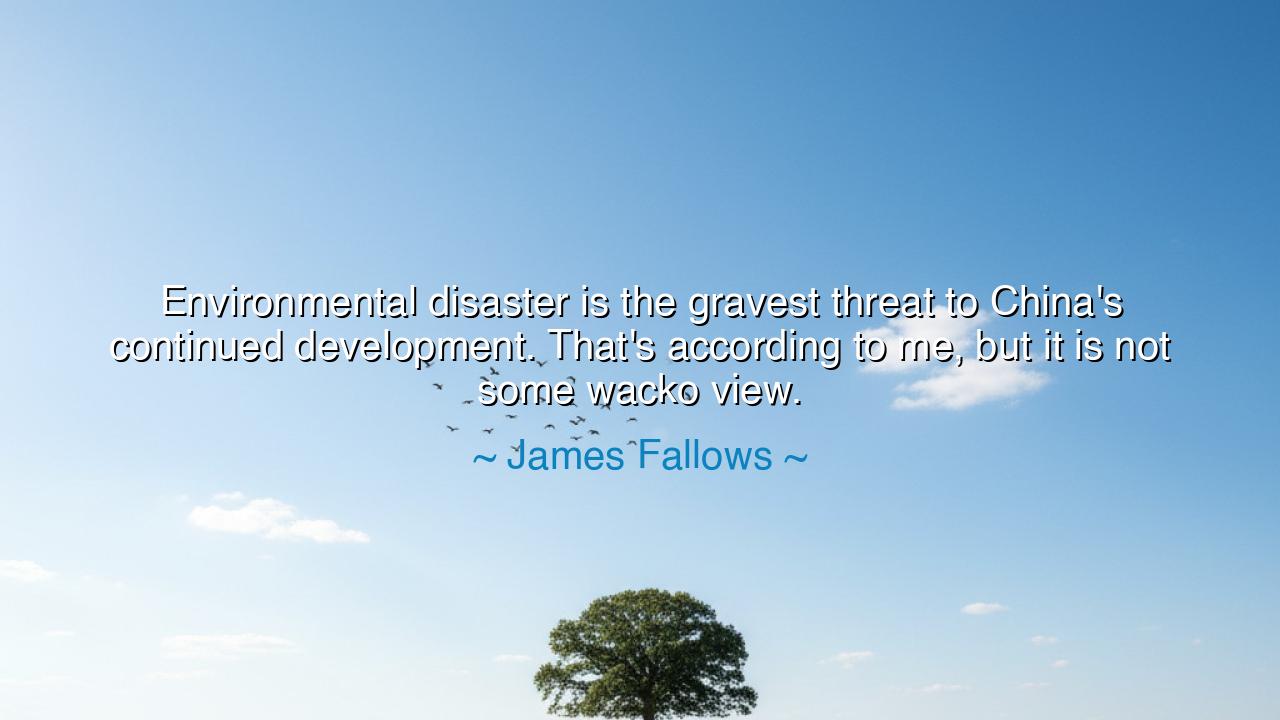
Environmental disaster is the gravest threat to China's continued
Environmental disaster is the gravest threat to China's continued development. That's according to me, but it is not some wacko view.






Hear the solemn words of James Fallows, who observed with clarity and foresight: “Environmental disaster is the gravest threat to China’s continued development. That’s according to me, but it is not some wacko view.” These are not the musings of a dreamer, but the warning of one who has walked the streets of China, breathed its heavy air, and seen the rivers darkened by pollution. His words remind us that no empire, no matter how mighty, can outrun the wounds it inflicts upon the earth. For development, if built upon poisoned soil and choked skies, will one day collapse under the weight of its own excess.
The meaning of this saying is that economic power, while mighty, cannot stand alone. A nation may raise towers of steel, build roads that stretch across deserts, and command the markets of the world—but if its people cannot breathe clean air or drink safe water, the illusion of progress will shatter. Fallows speaks to the paradox at the heart of modern China: its astonishing growth has lifted millions from poverty, yet its environmental destruction threatens to undo the very prosperity it has created. In this, he does not speak as a radical voice, but as one echoing the consensus of scientists, economists, and even leaders who know the cost of neglect.
History teaches us this lesson with merciless clarity. Consider the fall of the Sumerians, whose brilliance birthed the world’s first cities. Through reckless irrigation, their soil grew salty, their crops withered, and their civilization waned. Or recall the Great Smog of London in 1952, when unchecked coal burning shrouded the city in a poisonous fog that killed thousands in a single week. In both cases, human achievement was nearly undone by environmental failure. Fallows warns that China, if it does not correct its path, may suffer the same fate—its might crippled not by invaders, but by the air, water, and soil upon which all life depends.
This is no idle speculation. Already, villages in China have been named “cancer villages,” where polluted water has led to sickness and death. Skies in cities like Beijing have, at times, turned so dark with smog that planes could not land, and children were kept indoors for weeks. Rivers once used for fishing now run black, unfit for crops or drinking. These are not distant possibilities but present realities, the cracks already forming in the foundation of development. Fallows declares that to ignore such signs is folly, for a nation’s strength cannot outpace the decay of its land.
And yet, his words are not only despair—they are also a call to hope and responsibility. For if man has the power to destroy, he also has the power to renew. China has begun to invest heavily in renewable energy, in solar and wind, in reforestation and clean technology. These steps, though imperfect, show that the path can be altered if the will is strong. Fallows insists that the recognition of the problem is no “wacko view,” but the sober truth; and to face it is not weakness, but wisdom.
The lesson for us all is this: never separate progress from stewardship. Whether in a nation, a city, or a household, true development is not measured by wealth alone, but by the harmony between human endeavor and the natural world. If we exploit the earth for short-term gain, we will inherit long-term ruin. But if we guard the soil, the water, and the air as treasures beyond price, then prosperity can endure for generations.
Practical action lies before both nations and individuals. Support policies that reduce emissions and waste. Encourage industries that innovate in clean technology. In your own life, consume with mindfulness, reduce what you waste, and remember that every act of care for the earth is an act of care for your children’s future. For the disasters of the environment, once unleashed, do not respect borders or boundaries—they belong to all humanity.
So let the warning of James Fallows resound: environmental disaster is not the concern of radicals, nor the cry of the few, but the gravest threat to progress itself. If ignored, it will topple even the strongest nations. If heeded, it can guide humanity into a future where prosperity and the earth walk hand in hand. The choice belongs to us, and the time to act is now.






AAdministratorAdministrator
Welcome, honored guests. Please leave a comment, we will respond soon